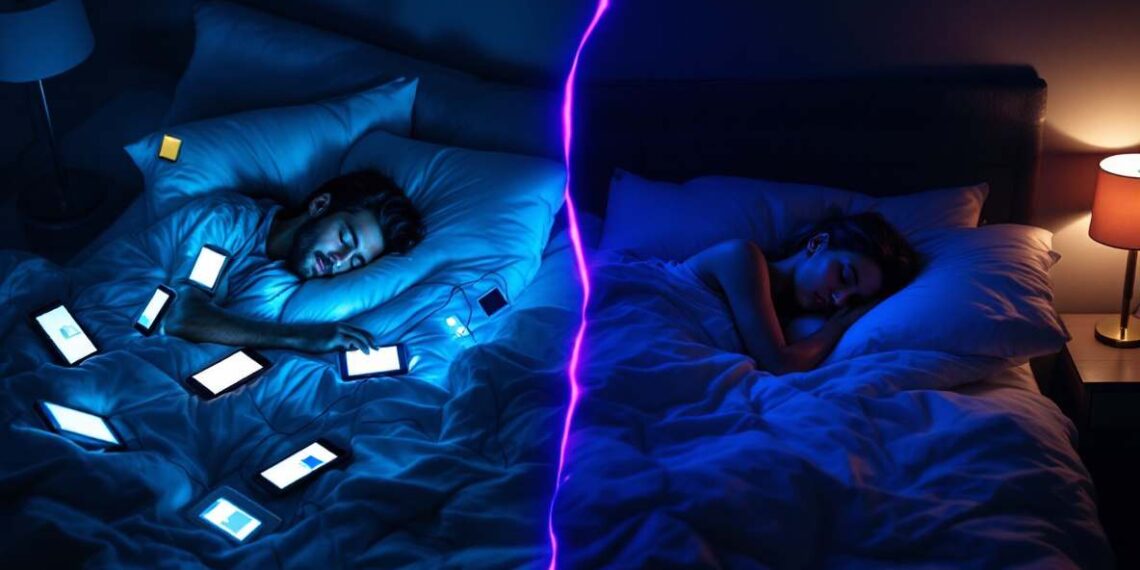Are you tossing and turning at night, with sleep as elusive as a cat in a roomful of rocking chairs? The culprit might be lurking right in your hand – that glowing screen you can’t seem to put down. In our hyper-connected world, where smartphones and tablets have become extensions of ourselves, the impact of screen time on sleep has never been more pronounced. From bleary-eyed toddlers to sleep-deprived seniors, the digital glow is casting a shadow over our collective slumber. But fear not, weary reader! Whether you’re a parent battling bedtime battles or an adult struggling to unplug, this deep dive into the screen time-sleep connection will illuminate the path to better rest. So, dim those lights, silence those notifications, and let’s explore how we can reclaim our right to a good night’s sleep in this digital age!
The Impact of Screen Time on Sleep
Introduction to Screen Time and Sleep Relationship
Screens are everywhere, from the TV to the smartphone, calling us like a bug to a light—all day and often into the night. This constant buzzing and beeping can throw sleep right out the window. People of all ages are glued to these glowing rectangles, but they often don’t realize the sleep price they’re paying for those late-night scrolls. Too much screen time, especially as you’re winding down, can make it tough to catch those precious Zs. You end up tossing and turning instead. Yeah, you’ve guessed it; that’s not good.
The American Academy of Pediatrics gives parents a nod: keep an eye on how much their kiddos are plugged in. But kids aren’t the only ones stuck; adults, you need to watch it too! Finally cracking the code of how screens mess with our sleep? That’s important for everyone, from the young pups to the old dogs.
Why is Screen Time Before Bed an Issue?
Scrolling away before you hit the hay? That’s bad news for your snooze. You’re setting yourself up for less sleep, harder-to-get sleep, and overall, just not great sleep.
| What Happens with Screens Before Sleep | What It Does to You |
|---|---|
| Blue Light Exposure | Keeps your sleepy hormone melatonin on hold |
| Engagement with Content | Cranks up the brain, making it hard to drift off |
| Disruption of Sleep Environment | Lights up your night, messing with the chill vibe you need for sleep |
Devices emit blue light, which tricks your brain into thinking it’s still party time—not sleep time. Your brain’s lights stay on, keeping that melatonin hormone under wraps, and that’s the hormone that tells you it’s bedtime, pal.
“Artificial light exposure between dusk and the time we go to bed at night suppresses release of the sleep-promoting hormone melatonin, enhances alertness and shifts circadian rhythms to a later hour—making it more difficult to fall asleep.” – Charles Czeisler, PhD, MD, Harvard Medical School
Now, if you’re diving into everything from TikTok rabbit holes to binge-watching the latest series, your brain is on overdrive. How can you expect it to switch off when you finally lie down? This is especially true for the young guns, teens, and twenty-somethings, who seem surgically attached to their gadgets at midnight.
Parents, learning about things like newborn sleep patterns or toddler sleep regression might help cut out some of the bedtime tech. Keeping the older crew in mind, especially those juggling senior sleep apnea, finding a screen balance can actually give sleep a nudge in the right direction.
Balancing your screen time and catching quality sleep is crucial for feeling good and staying sharp, no matter how old you are. Need more tips on getting better sleep? Sneak a peek at our tips on teenage sleep deprivation and ways to improve sleep naturally.

Sleep and Screen Time by Life Stage
When it comes to screens, they’re everywhere—from toddlers to seniors, screens are part of our daily lives. But what does that mean for our sleep? Let’s break it down.
Parents of Young Children
For parents wrangling young kiddos, keeping tabs on screen time isn’t just a good idea—it’s a must. Not only do the littles get affected, but guess what? So do you! Too much screen time before lights out can mess with nighty-night routines, making everyone a bit grumpy come morning.
| Child Age Group | Recommended Screen Time (Hours) | Effects of Screen Time on Sleep |
|---|---|---|
| Newborns (0-3 months) | None | Sleep? What’s that? Plans totally upside-down! |
| Toddlers (1-3 years) | 1 | Easily hit a sleep regression; toddler sleep regression headache alert! |
| Preschoolers (3-5 years) | 1 | Struggles nodding off; preschooler sleep habits can go haywire |
Turn off those screens, especially when the sun goes down, to get bedtime back on track.
Teenagers and Young Adults
Teenagers and folks in their early twenties are glued to their phones, often when they should be snoozin’. Between Snapchatting and leveling up in games, bedtime doesn’t stand a chance. Those pesky screens’ sneaky blue light? It keeps their sleepiest hormone, melatonin, at bay.
| Age Group | Average Sleep Hours Needed | Average Sleep Hours Achieved | Effect of Screen Time |
|---|---|---|---|
| Teenagers (13-19 years) | 8-10 | 6-7 | Big risk of teenage sleep deprivation, ugh! |
| Young Adults (20-30 years) | 7-9 | 6-7 | Burnout and brain fog—have you met? |
Encourage these night owls to unplug an hour before bed to up their sleep game.
Middle-Aged Adults
Adults cruising through middle age got their hands full—work, life, and, of course, more screens. From binge-watching shows to late-night email marathons, screens creep into the late hours, setting sleep patterns way off balance.
| Age Group | Common Sleep Issues | Recommended Strategies |
|---|---|---|
| Adults (30-50 years) | Insomnia, perimenopause sleep issues | Get your bedtime groove back; ditch screens after dark; sleep tips for 30s |
Toss those devices aside and embrace those zzzs like you mean it.
Seniors and Their Caregivers
Seniors might use screens for keeping tabs on health or for streaming classic films, but they also need to be mindful. Too much screen time? It can send their sleep on a wild ride, causing bumpy nights and daytime drowsiness.
| Age Group | Common Concerns | Tips to Improve Sleep |
|---|---|---|
| Seniors (65+) | Interrupted sleep, fuzzy memory | Stick to screens when the sun’s up; chill on them post-dinner; check out senior sleep health |
Balancing screen time means better snooze quality and brighter days.
Insights for Healthcare Professionals
Healthcare pros, you’re the unsung sleep heroes! Your job? School folks on how screens mess with sleep across age groups. Each stage has its quirks, but everyone’s craving that sweet, sweet rest.
| Life Stage | Key Considerations | Suggested Strategies |
|---|---|---|
| Parents | Being a good screen role model | Plan family fun that promotes a snooze-friendly zone |
| Teenagers | Tackling sleep shortages | Talk up the do’s and don’ts of good sleep |
| Middle-Aged Adults | Juggling job stress | Push for ‘me time’ wind-down sessions |
| Seniors | Keeping memory sharp | Spill the beans on how screens can wreck sleep and overall health |
Armed with this scoop, healthcare workers can guide folks to snag healthy snooze patterns.
Tips for Improving Sleep Habits
Trying to get a good night’s sleep? It could be simpler than counting sheep. Here’s the lowdown on making that happen without losing your cool to the chaotic glow of digital screens.

Establishing a Technology-Free Routine
Trading screen time for some good ol’ fashion R&R can do wonders for winding down. Swap that late tic-tac-toe with your phone for activities that tell your brain it’s sleepy time.
| Time Before Bed | Suggested Activity |
|---|---|
| 1 hour | Get lost in a book |
| 30 minutes | Try meditation or taking deep breaths |
| 15 minutes | Do some gentle stretching or yoga |
Getting the whole household in on a digital detox before bed can be especially golden if you’ve got kiddos. Encourage a calm atmosphere to smooth the path to dreamland for everyone.
Setting Screen Time Limits
Reining in screen hours before bed can be a real game changer for sleeping like a log. Setting some boundaries can help folks size up their habits and build a healthier tech balance.
| Age Group | Screen Time Limits |
|---|---|
| Younger Kids | 1 hour a day |
| Teens | 2 hours a day |
| Grown-Ups | 2 hours a day |
Tech can actually help limit itself; download apps that monitor screen usage. Chat about these limits as a family to foster a sense of teamwork and keep each other on track.
Creating a Cozy Bedroom
Turning your room into a chill zone is key for snooze success. Make this space your zen headquarters to welcome in a good night’s rest.
| Element | Suggestions |
|---|---|
| Lighting | Blackout curtains to keep it dark |
| Temperature | Make it nice and cool, around 60-67°F |
| Noise | Drown out distractions with white noise or earplugs |
Consider kicking gadgets out of the bedroom. Less temptation means more sleep-focused actions. For more tips on catching those Z’s, check out our article on improve sleep naturally.
By putting down the devices, setting screen time limits, and making your bedroom cozy, everyone can up their sleep game.
Understanding Screen Time and Its Influence on Sleep
These days, technology seems to have become that clingy friend who’s always around, making the relationship between screen time and sleep more relevant. We’re about to dive into how blue light affects your sleep mojo, and how screen time can throw your natural sleep rhythm off track.

How Blue Light Messes With Your ZZZs
Ever try drifting into dreamland only to find yourself wide awake because you’ve been glued to your phone or computer? Blame blue light. This high-energy light spills from your gadgets and messes with your melatonin—the sleepy-time hormone.
Here’s the scoop on blue light’s funky effects:
| Effect | What It Means |
|---|---|
| Harder to Fall Asleep | Screens can make dozing off feel like an Olympic event. |
| Crummier Sleep Quality | You know those mornings when you wake up feeling like you barely slept? Yeah, blue light. |
| Wonky Sleep Patterns | Hang onto those regular hours, or your internal clock might just go haywire. |
Need a hand with the kiddos’ sleep antics? Check out our bits on newborn sleep patterns and preschooler sleep habits.
Circadian Misadventures
Your body has this super cool internal clock that keeps your sleep-wake cycle in check, called the circadian rhythm. But blue light tricks your brain into thinking it’s still time to hustle, not nap.
Here’s what too much screen time at night can do:
| Screen Time Before Bed | What Happens? |
|---|---|
| 1-2 hours | You might struggle to nod off. |
| 2-3 hours | Sleep onset’s delayed, and REM sleep’s compromised. |
| 3+ hours | Say goodbye to that solid sleep schedule and hello to chaos. |
Getting wise about how screen time affects your snooze can spur you to set some healthy screen limits, especially when it’s bedtime story hour. For more bedtime heroics, hop over to our guide on how to improve sleep naturally.
Strategies for Reducing Screen Time
Cutting down on screen time can be like hitting the snooze button on a noisy world, helping folks across the board catch some better Z’s. Finding ways to ease up on those screens, especially before hopping into bed, can lead to more restful sleep sessions.
“Sleep is that golden chain that ties health and our bodies together.” – Thomas Dekker
Taking a Break from Screens
Ever thought of chucking your phone into a drawer and pretending it doesn’t exist for a while? That’s what a digital detox is all about. It’s giving yourself a breather from digital gadgets to get back in touch with the real world, especially before bedtime. Setting a regular device-free zone in your evening can make bedtime a bit more chill.
| How Long to Unplug | What’s in it for You? |
|---|---|
| 1 Hour | Helps cool down for better sleep |
| 2 Hours | Offers chill-out time and maybe a good book |
| Whole Night | Perfect for bonding with family and finding some peace |
Taking baby steps and slowly stretching out your screen breaks makes it easier to roll with the changes. Chat with family about setting your personal “screen-time cut-off” goals.
Finding Fun Before Bed Without a Screen
Slipping into a screen-free routine before bed doesn’t need to be a snooze-fest. There are tons of things to do that are way more fun than scrolling through cat memes. Think about diving into a book, scribbling in a journal, or doing a bit of meditation and stretching.
| Thing to Do | Why It Rocks |
|---|---|
| Grab a Book | Calms you down and ditches stress |
| Keep a Journal | Clears your mind from pesky thoughts |
| Meditate a Bit | Boosts mindfulness, making you zen |
Such activities allow your brain to ease up, paving the way for sweeter dreams. Filling up “me-time” with stuff that doesn’t involve staring at a screen can boost your sleep routine at any age. For more sleep hacks geared for different age brackets, check out stuff like teenage sleep deprivation or senior sleep apnea. Making these small tweaks can lead to healthier screen habits and much better snooze sessions.
Conclusion:
As we power down from our exploration of screen time’s impact on sleep, it’s clear that our glowing gadgets are more than just distractions – they’re potential sleep saboteurs. From the melatonin-suppressing blue light to the engagement that keeps our minds buzzing, screens have become the uninvited guests in our bedrooms. But armed with knowledge and strategies, we can turn the tide on this digital invasion of our sleep space. Whether you’re a parent guiding young children, a teenager navigating the social media landscape, or an adult trying to balance work and rest, there are practical steps to take. By establishing tech-free routines, creating cozy sleep environments, and finding screen-free alternatives for winding down, we can all work towards healthier sleep habits. Remember, quality sleep isn’t a luxury – it’s a necessity for our physical and mental well-being. So, as you reach for your device tonight, pause and consider: is that last scroll worth the cost of your precious ZZZs? Sweet dreams and happy unplugging!
FAQs with answers:
Q1: How does screen time before bed affect sleep?
A1: Screen time before bed can delay the release of melatonin (the sleep hormone), increase alertness, and make it harder to fall asleep. It can also reduce the quality and quantity of sleep.
Q2: What’s the recommended screen time limit for different age groups?
A2: The American Academy of Pediatrics recommends no screen time for children under 18 months (except video chatting), 1 hour per day for children 2-5 years, and consistent limits for older children. Adults should aim to limit recreational screen time to 2 hours before bed.
Q3: How can I create a “screen-free” bedroom environment?
A3: Remove TVs and computers from the bedroom, charge phones and tablets outside the room, use blackout curtains to block outside light, and consider using a traditional alarm clock instead of a phone alarm.
Q4: Is all screen time equally harmful to sleep?
A4: While all screen time can impact sleep, the content matters. Engaging, stressful, or exciting content can be more disruptive than calming or educational content. However, the blue light emitted by all screens can still affect sleep patterns.
Q5: How long before bed should I stop using screens?
A5: Experts recommend avoiding screens for at least 1-2 hours before bedtime to allow your body to naturally prepare for sleep.
Additional resources and authority references:
- National Sleep Foundation:
https://www.sleepfoundation.org/articles/how-blue-light-affects-kids-sleep - Harvard Health Publishing:
https://www.health.harvard.edu/staying-healthy/blue-light-has-a-dark-side - Sleep.gov:
https://www.nhlbi.nih.gov/health-topics/sleep-deprivation-and-deficiency - American Academy of Sleep Medicine:
https://aasm.org/resources/pdf/pediatricsleepdurationconsensus.pdf








